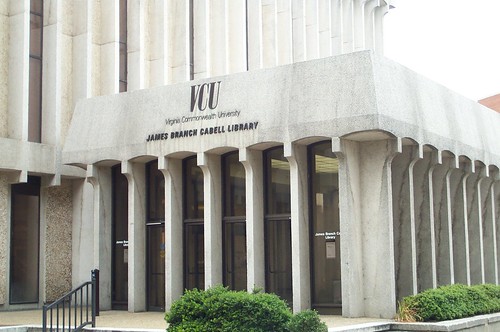Member libraries have full access to the scanned books, but visitors can still search the catalog and receive page references for the appearance of keywords in the full-text, and even some full view titles (see, for example, John Lehmann's 1960 autobiography, I Am My Brother). I've been poking around, looking for references to Henry Reed. To my surprise, I actually turned up a book with a whole 6-page section devoted to Reed, in Bruce K. Martin's British Poetry Since 1939 (Boston: Twayne, 1985), necessitating a trip to town to track down a copy at VCU's James Branch Cabell Library:
In the chapter "Poetry in Wartime: Douglas, Lewis, and Reed," Martin surveys Reed's only volume of poetry, and finds "it is difficult to discern in the mere twenty-four poems making up A Map of Verona any pervasive ideology," though "even the least interesting of Reed's pieces combines a delicacy of tone and prosodic caution generally absent from the work of his contemporaries in uniform writing more realistically" (p. 41).
Furthermore, he sees Reed's tendency toward extended monologue as a natural prelude to his freelance career writing for the BBC: "Reed's less distinguished poems further suggest his gravitation toward dramatic characterization, a trend wholly realized in his later career as a distinguished writer of dramas and radio plays."
While we may regret that Reed has written few poems since the publication of A Map of Verona, his decision to shift his attention as a writer appears in retrospect a most logical and plausible outcome of developments evident in his poetry. Clearly he was moving toward something like drama, as his poetry increasingly came to resemble spoken words determined by the specifics of personality, time, and place. In this Reed resembles Keith Douglas and Alun Lewis, as well as many other wartime poets, for he ultimately shows a distrust of the large-scale statement, empty rhetoric, and vague romanticism that had infected English poetry during the thirties and early forties. That Reed's own solution to such a dilemma was unique makes him no less a representative figure.
(p. 45-46)
One minor point: Martin describes the instructor's exhortation in "Unarmed Combat" that "The readiness is all" as an "unwitting allusion to Lear" (p. 43), referring to Edgar's pronouncement: "Men must endure / Their going hence, even as their coming hither; / Ripeness is all: come on" (Act V, scene ii). Looking to Hamlet, however, we find the Prince of Denmark telling Horatio, directly:
Not a whit, we defy augury: there's a special
providence in the fall of a sparrow. If it be now,
'tis not to come; if it be not to come, it will be
now; if it be not now, yet it will come: the
readiness is all: since no man has aught of what he
leaves, what is't to leave betimes?








